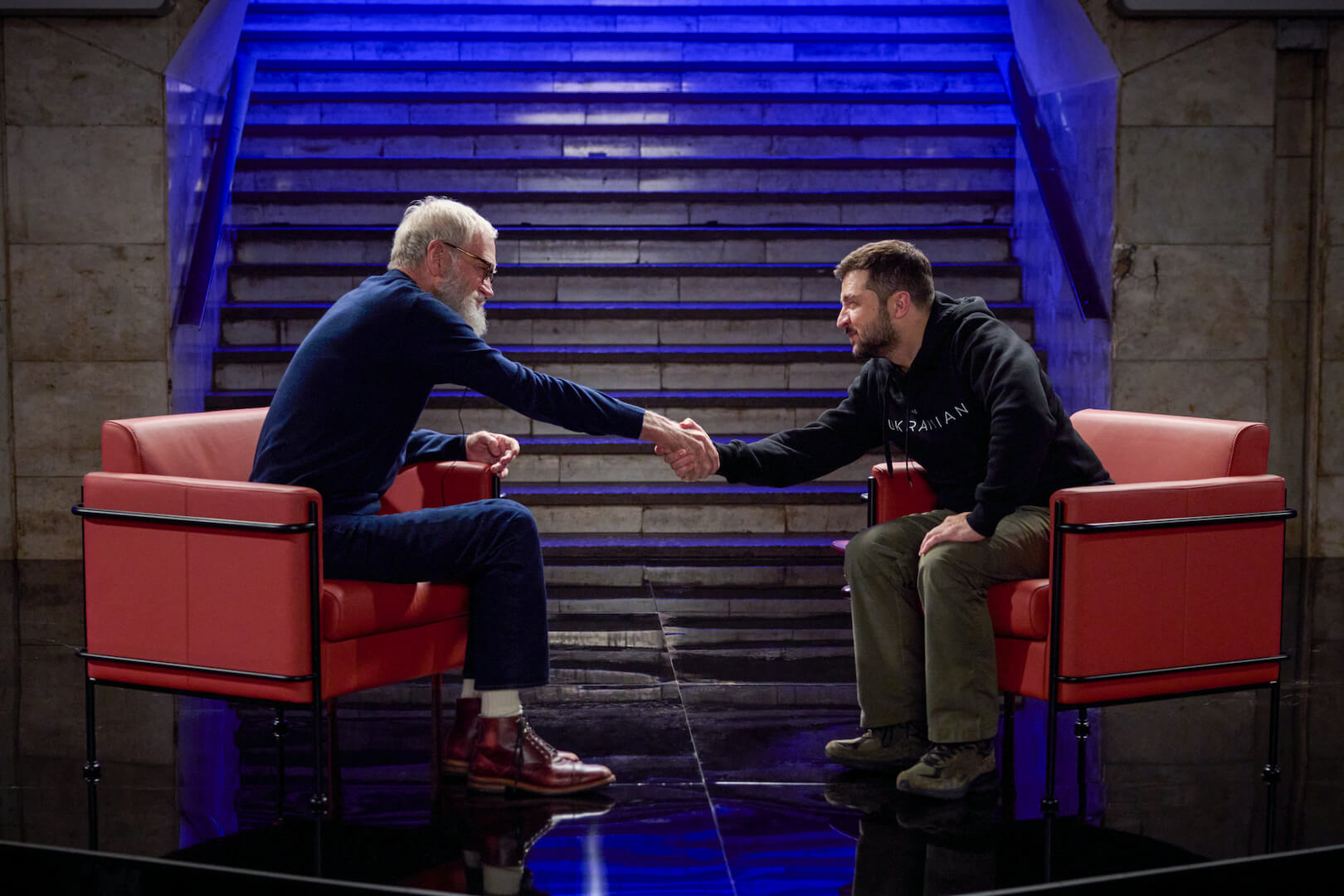Why Zelenskyy made a Jewish joke in his Netflix interview with David Letterman
The Ukrainian President hasn’t made much of his background — but he’s happy to joke about it

David Letterman and Volodymyr Zelenskyy, two comics who’ve come into gravitas, shake hands. Courtesy of Netflix
Halfway through his interview with David Letterman, an otherwise dour Volodymyr Zelenskyy makes a Jewish joke.
“Two Jewish guys from Odesa meet up,” Zelenskyy said, 300 feet below the streets of Kyiv on an active subway platform.
One Jew asks the other about “the situation,” and the other tells him that Russia is fighting NATO. Things are going badly for Russia. 70,000 dead Russian soldiers, depleted missile supplies, damaged equipment.
“What about NATO?” the Jew seeking news asks.
“‘What about NATO? NATO hasn’t even arrived yet!’”
It’s a rare moment of levity in the conversation, a special installment of Netflix’s My Next Guest with David Letterman, and it only comes after some prodding from Letterman about Zelenskyy’s past as a comedian and the necessity of humor during difficult times. But the joke, which skewers Russia’s lack of readiness and NATO’s level of support for Ukraine, is also a rare expression of Jewishness from a figure who has only occasionally addressed his heritage.
When CNN’s Jake Tapper paid a visit to Zelenskyy during Passover, the journalist’s attempt to draw a parallel to the holiday and the Ukrainian fight for freedom out of the president fell flatter than the bread of affliction. (Zelenskyy also seemed indifferent to Tapper’s gift of matzah — probably because he needed munitions more than an afikoman.)
This is to be expected. The American press seems to make more of Zelenskyy’s Jewishness than he does. Throughout the war, perhaps his most direct invocation of his Jewish background has been in his plea to the Knesset, where he controversially compared Russian plans for Ukraine to the “final solution.”
But if one looks back at his comedy career, which we only glimpse in Letterman’s special, we are able to see a more Jewish side of Zelenskyy, who, growing up in the Soviet era, had fewer opportunities to express that identity. Humor, it seems, is where he connects to Jewishness, and, given that it shaped his ultimate trajectory from an actor playing the president to the actual head of state, it is in no way superficial.
Zelenskyy may not have had a bar mitzvah, but he did pretend to play “Hava Nagila” on the piano with his testicles. The gravity of his current position may not allow for such displays, but it’s telling that, when offering a joke, Zelenskyy decided to make it a Jewish one.
Looking it over, though, we may wonder what makes the joke Jewish, apart from its interlocutors. Couldn’t it just have easily been two nondescript Odesans? Or Kyivans?
In an interview with The Washington Post, Letterman seemed to think the specifics were interchangeable.
“I love the universality of that joke,” Letterman said. “It can’t just be a guy walks in. It’s got to be the Jewish guy. It’s a priest, it’s a rabbi. It’s a Buddhist, you know, walk into a bar. It’s just like, yeah, why not?”
But I think that’s missing something essential. The spirit of the joke — the delay of a vital piece of information, the punch-up jab at NATO, the sense that the speakers are underdogs left to fight their war alone and somehow winning anyway — means more when coded as Jewish. In fact, given the context, it’s maybe more Jewish than it is funny.
Stepping back a bit, it takes a kind of chutzpah for the president, now receiving billions in aid from NATO, to drag the organization like that — particularly while his country is seeking membership status. (That’s not to say he’s wrong in his critique.)
But maybe I’m overthinking it. The people in the joke, and its point of view, are Jewish because the man telling it is.
















